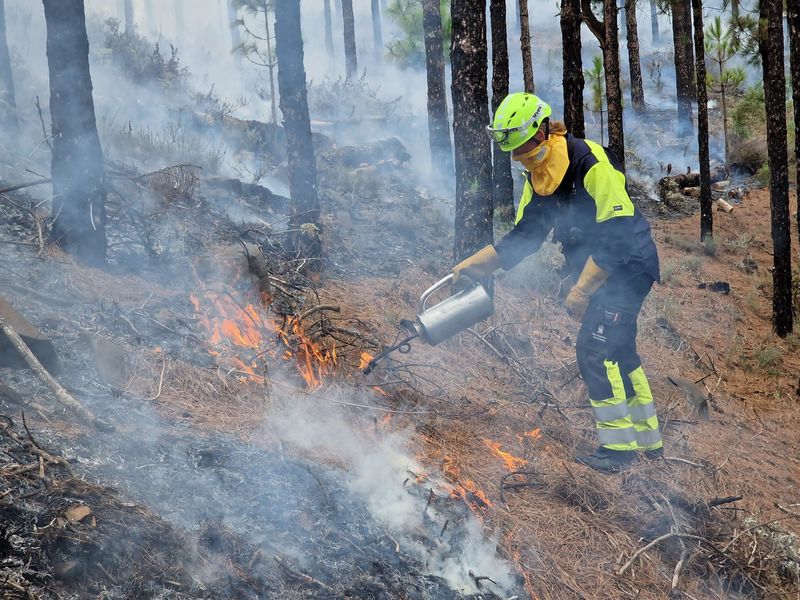On June 15, the “Declaration on the management of great wildfires in Spain”, a consensus document among experts from Community of Wildires, was presented simultaneously at the Museum of Natural Sciences in Madrid and in Montserrat (Barcelona). Both presentations were attended by representatives of various sectors of the Fire Community who commented on and assessed the contents of the declaration.

In Madrid, speakers included Enrique Segovia, WWF Director of Conservation; Juan Sánchez, Director of INFOCA; Virgina Carracedo, Researcher at the University of Cantabria, and Luis Berbiela, member of the Board of Trustees of the Pau Costa Foundation.
Montserrat’s presentation was attended by Eva Saldaña, Executive Director of Greenpeace Spain; Marc Castellnou, President of the Advisory Council of the Pau Costa Foundation and Head of the GRAF Area of The Catalan Fire and Rescue Service; Miquel Rafa, Director of Sustainability and Nature of the Catalonia La Pedrera Foundation; Marta Corella, SOS Mundo Rural and former Mayoress of Orea, and Míriam Piqué, President of the Board of Trustees of the Pau Costa Foundation and researcher at the CTFC.

“The public presentation of the Declaration is the culmination of a process that we started six months ago to find a meeting point between different visions and interests within the wildfire community. We are at a critical moment, and the entire community sees clearly that the problem of great wildfires cannot be addressed with simple solutions or beliefs, nor with biased or incomplete discourses. As a society, we have the responsibility to face this challenge and this declaration aims to put on the table the urgent demands that we as a society must address”, says Jordi Vendrell, Director of the Pau Costa Foundation.
Spain is facing a complex problem that is getting worse every day with climate change: fires are becoming more intense and have unprecedented ecological and social consequences. Examples of this are the great wildfire in Castellón-Teruel at the end of March 2023 or the fires that occurred in the summer of 2022 (Sierra de la Culebra, Navarra, Bejís, Vall d’Ebo and Sierra Calderona).
Based on this verification, in early 2023 the Pau Costa Foundation promoted a process to bring together experts from different sectors of the Community of Wildfires (academics, emergency services, forest managers, communicators, public administration, private companies) to review, update and establish a new common approach that integrates different professional and social visions, for an effective and safe management of wildfires. To this end, the Forum for debate and proposals for action for the management of great wildfires in Spain was held (29 and 30 March 2023, Madrid), the results of which are the basis of the Declaration that has been presented in Madrid and Barcelona.

The declaration includes a 15-point proposal that stresses the need to focus on fire risk management (prevention) over extinction. To this end, it points out the need for society to become involved and co-responsible in fire risk management and to assume that it is inevitable to coexist with fire, as an element that is part of our ecosystem. Likewise, it is urged to implement sustainable forest management, taking biodiversity as a priority, and counting on the use of prescribed fire and economic measures that guarantee the development of the rural world. The provision of rigorous data, as well as dissemination and education are pointed out as key tools to integrate the urban and rural visions in the face of wildfires and to guarantee the existence of a culture of prevention and self-protection. All this in accordance with a legislative framework that integrates the wildfire management to anticipate, guarantee and finance that it primarily addresses the preventive management of the territory.

“Any proposal for the management of great wildfires must be based on the scientific data, on the experience of the extinction services and on the needs of the territory, which are mainly denounced by the actors of the rural world. And that is reflected in the declaration that we have presented. We can affirm that we have a minimum common denominator on key aspects such as the management of forest ecosystems and territorial planning; on measures to have lively rural communities; the uses and ecology of fire; and the importance of education to create resilient and adapted societies”, says Vendrell.
So far, more than 400 people and institutions have joined, including environmental organisations such as Greenpeace and WWF; public departments and organisations such as the Directorate General for Biodiversity, Forests and Desertification of the Ministry for Ecological Transition and the Demographic Challenge, research centres such as the Desertification Research Centre (CSIC-UV-GV) or CREAF, and people from all sectors of the Community of Wildfires. Adhesion to the Declaration can be done through the website of the Pau Costa Foundation in order to gather support. From here, after the summer, meetings will be arranged with national and European leaders to convey the contents of the Declaration.
Online access to the Declaration, Press Release, previous work to reach consensus and accession form, through this link.






